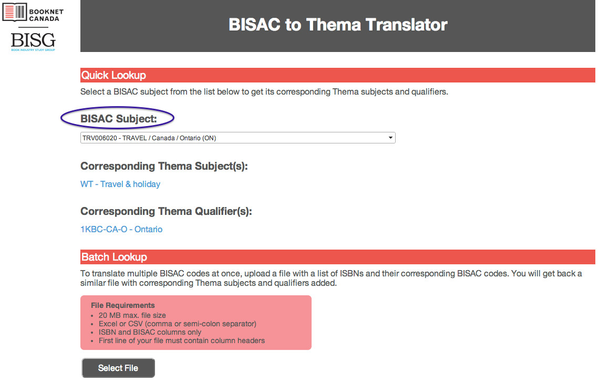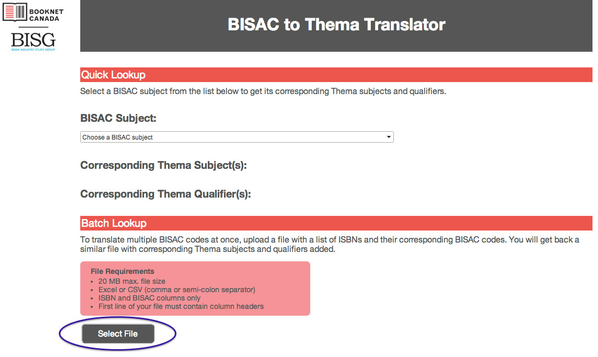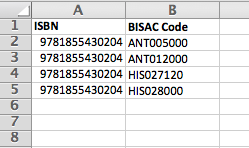BISAC to Thema Translator
Table of Contents
Current installed version: BISAC 2023 to Thema 1.5
BISAC 2023 to Thema 1.5 mapping now installed.
Introduction
The BISAC to Thema Translator provides one-off and batch translations from BISAC Subject Codes to Thema Subject Codes based on the Book Industry Study Group (BISG) mapping.
You can use the translator here: https://bisactothema.biblioshare.ca
About BISAC Subject Codes
BISAC Subject Codes are the North American subject classification standard for physical and digital books. Publishers use them to categorize books according to topical content. BISAC subjects identify to retailers where these books should be shelved or which genre they should be grouped in.
A BISAC subject listed in an ONIX file should be as specific as possible – avoid choosing a "General" subject if possible, as they provide the least information to retailers.
The BISAC Subjects Codes List is maintained by the Book Industry Study Group. This list is updated once a year – the idea is that it continually mirrors the needs of retailers – and publishers are expected to update their lists yearly to reflect those changes.
The complete BISAC Subject Headings List is available online at no cost for looking up subjects one by one. You may also request an End Users' License to download versions of the Subject Headings List in Excel, PDF, and Word for unlimited use or for incorporation in your company's internal databases.
About Thema
Thema is a global subject classification system for books with wide and growing international participation. It is meant to help reduce having to map multiple national and specialist schemes to one another when trading with international partners.
Thema combines a single international subject code list with six qualifier lists. The subject code list is hierarchical and has top-level categories (Eg. Fiction) that are divided into sub-categories (Eg. Fiction - Crime & Mystery). A subject code can also be given more granular context using qualifiers (Eg. Geographical, Language, etc.). Qualifier lists have international codes as well as country-specific codes, which originate from and are maintained by different countries.
For more information on how to use Thema subjects and qualifiers, have a look at our documentation.
What about the BISAC Classification Schemes?
At least for Canada and the US, we fully expect that BISAC will continue to be used and developed in our market, and users should not stop classifying their books with BISAC. BISAC and Thema can co-exist on the same book so there is no need to worry.
BookNet Canada's Role
BookNet Canada sits on both the BISAC and Thema subjects committees, where decisions are made about which new codes are needed and whether old ones should be discontinued. The Canadian Bibliographic Committee works at creating Canadian-specific BISAC and Thema subjects and regional themes.
A list of Canadian-specific BISAC Subjects can be found here.
The Thema Canadian National Qualifier list can be found here.
If you would like to discuss any of the Classification Schemes, send us an email at biblio@booknetcanada.ca.
About the BISAC to Thema Mapping
The BISAC to Thema mapping was developed by the BISG Thema Working Group, a task force of the Subject Codes Committee. The version used in our translator tool maps BISAC 2017 (released Fall 2017) to Thema 1.3 (released Spring 2018). The mapping is updated yearly, sometime around January or February, but unfortunately Thema major update happens in March or April and the mapping lags until the next winter.
The complete mapping is available as an Excel spreadsheet for free to all BISG members and alongside the purchase of a BISAC EULA for non-members. Contact BISG to obtain your copy.
Please note that this mapping is meant as a guide, and user discretion is needed. When the mapping is applied to an individual title, it is expected that users will confirm that the Thema code(s) indicated are the best match for the title.
Using the BISAC to Thema Translator
The translator allows for two ways in which to look up code translations. After confirming your human status by entering your email address and recreating the captcha (don't worry, we won't email you unless you ask us to), you can either perform a quick one-off lookup of a BISAC code or you can upload a list of BISAC codes for translation.
Quick Lookup
To look up the Thema translation of a single BISAC code, simply type to search for the BISAC code, or select a BISAC subject from the drop-down list. Once you've made a selection, the translator will return the corresponding Thema subject and qualifiers in the sections below.
The mapping is not 1:1, so it is possible for a single BISAC subject to correspond to multiple Thema subjects and qualifiers. BISG recommends using all Thema subjects/qualifiers returned for any given BISAC code, rather than selecting a single option from the results.
While every BISAC code corresponds to at least one Thema subject, it is possible for there to be no associated qualifiers. In such cases, you will see "None" in the qualifier code section.
Batch Lookup
To look up the Thema translations for multiple BISAC codes at a time, you can upload an Excel or CSV file containing ISBNs and their corresponding BISAC codes. The uploaded file should have column headings in the first row, followed by a single ISBN-BISAC pairing per row.
Here is an example of how your file should be structured:
Once your file has finished uploading, the translator will generate a new file, in the same Excel or CSV format you used, with all Thema translations included. This resulting file will download automatically on your end.
Here is an example of a batch translated file:
Thema ONIX Sample
A separate page showing how the content is displayed in ONIX is here
Contact Us
If you have any questions or comments, then you can reach us at bisactothema@booknetcanada.ca.



